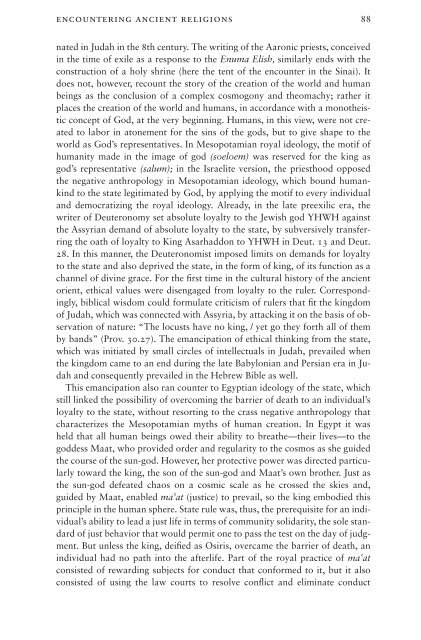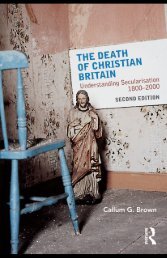Create successful ePaper yourself
Turn your PDF publications into a flip-book with our unique Google optimized e-Paper software.
encountering ancient <strong>religions</strong> 88<br />
nated in Judah in the 8th century. The writing of the Aaronic priests, conceived<br />
in the time of exile as a response to the Enuma Elish, similarly ends with the<br />
construction of a holy shrine (here the tent of the encounter in the Sinai). It<br />
does not, however, recount the story of the creation of the world and human<br />
beings as the conclusion of a complex cosmogony and theomachy; rather it<br />
places the creation of the world and humans, in accordance with a monotheistic<br />
concept of God, at the very beginning. Humans, in this view, were not created<br />
to labor in atonement for the sins of the gods, but to give shape to the<br />
world as God’s representatives. In Mesopotamian royal ideology, the motif of<br />
humanity made in the image of god (soeloem) was reserved for the king as<br />
god’s representative (salum); in the Israelite version, the priesthood opposed<br />
the negative anthropology in Mesopotamian ideology, which bound humankind<br />
to the state legitimated by God, by applying the motif to every individual<br />
and democratizing the royal ideology. Already, in the late preexilic era, the<br />
writer of Deuteronomy set absolute loyalty to the Jewish god YHWH against<br />
the Assyrian demand of absolute loyalty to the state, by subversively transferring<br />
the oath of loyalty to King Asarhaddon to YHWH in Deut. 13 and Deut.<br />
28. In this manner, the Deuteronomist imposed limits on demands for loyalty<br />
to the state and also deprived the state, in the form of king, of its function as a<br />
channel of divine grace. For the first time in the cultural history of the ancient<br />
orient, ethical values were disengaged from loyalty to the ruler. Correspondingly,<br />
biblical wisdom could formulate criticism of rulers that fit the kingdom<br />
of Judah, which was connected with Assyria, by attacking it on the basis of observation<br />
of nature: “The locusts have no king, / yet go they forth all of them<br />
by bands” (Prov. 30.27). The emancipation of ethical thinking from the state,<br />
which was initiated by small circles of intellectuals in Judah, prevailed when<br />
the kingdom came to an end during the late Babylonian and Persian era in Judah<br />
and consequently prevailed in the Hebrew Bible as well.<br />
This emancipation also ran counter to Egyptian ideology of the state, which<br />
still linked the possibility of overcoming the barrier of death to an individual’s<br />
loyalty to the state, without resorting to the crass negative anthropology that<br />
characterizes the Mesopotamian myths of human creation. In Egypt it was<br />
held that all human beings owed their ability to breathe—their lives—to the<br />
goddess Maat, who provided order and regularity to the cosmos as she guided<br />
the course of the sun-god. However, her protective power was directed particularly<br />
toward the king, the son of the sun-god and Maat’s own brother. Just as<br />
the sun-god defeated chaos on a cosmic scale as he crossed the skies and,<br />
guided by Maat, enabled maÚat (justice) to prevail, so the king embodied this<br />
principle in the human sphere. State rule was, thus, the prerequisite for an individual’s<br />
ability to lead a just life in terms of community solidarity, the sole standard<br />
of just behavior that would permit one to pass the test on the day of judgment.<br />
But unless the king, deified as Osiris, overcame the barrier of death, an<br />
individual had no path into the afterlife. Part of the royal practice of maÚat<br />
consisted of rewarding subjects for conduct that conformed to it, but it also<br />
consisted of using the law courts to resolve conflict and eliminate conduct








